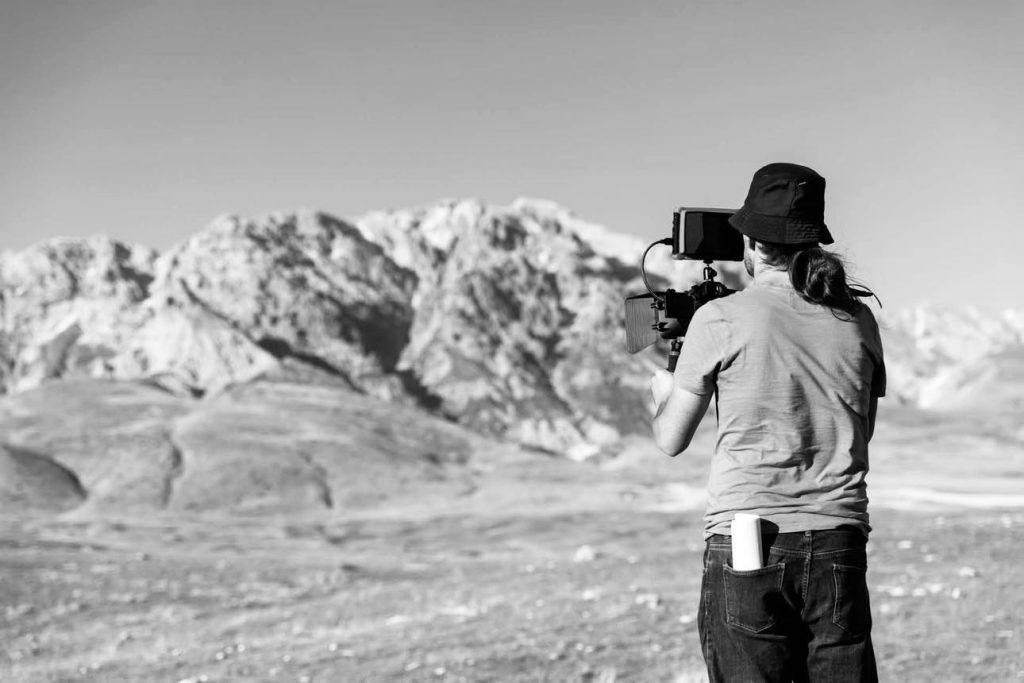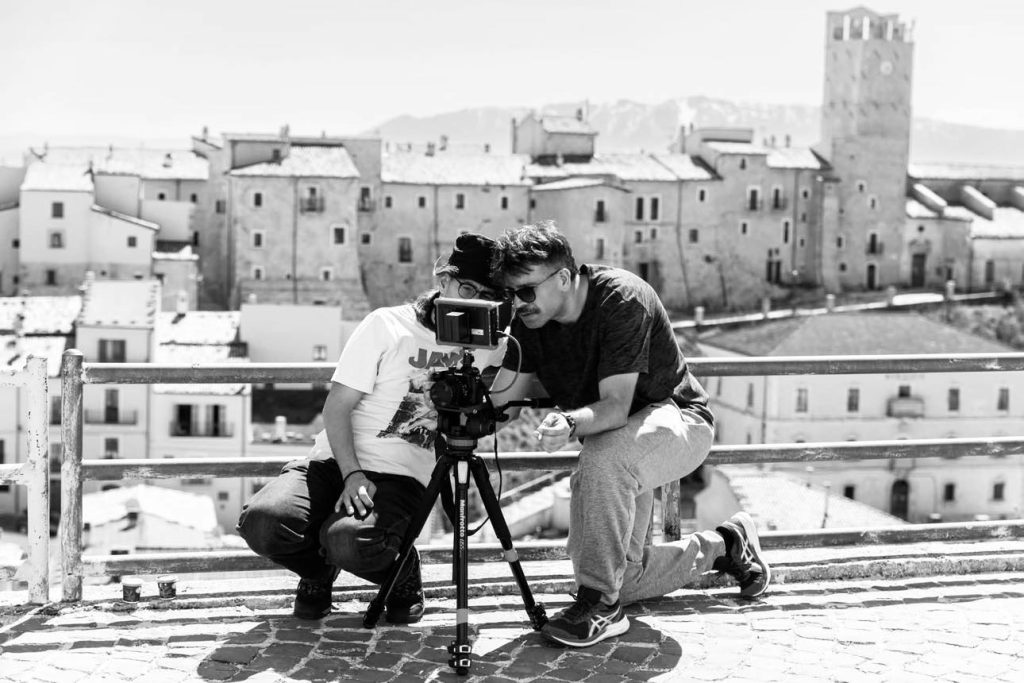
– Who is Mattia Paone?
It’s very hard to talk about oneself—telling stories is easier. I was born and live in Abruzzo, which could be described as the wild side of Italy. Since I was a child, I’ve been drawn to mysteries and the magical side of things. I feel a strong connection to nature and the universe, always in search of the eternal, the infinite—things that time cannot corrupt or erode. And in cinema, I found the perfect playmate.
After earning a degree in Communication, I enrolled in an acting course, where I met several people, including the ideal lead actor for the story I wanted to tell. That’s how Midnight Green (Verde di mezzanotte, 2014) was born—a thriller set entirely in my homeland, with a budget of just 500 euros. I started with a feature film without ever having done anything before. I took on writing, directing, editing, and more. The journey of Midnight Green lasted two and a half years, from script to post-production, and it was an incredible satisfaction to see the film projected on the big screen.
Afterward, I attended two film schools—one in Abruzzo and the other in Rome, Sentieri Selvaggi—where I earned two Master’s degrees in Screenwriting and Directing. During this time, I made several short films and documentaries, leading up to AVIO – Absence of Vitality in the Intact Organism (2022), a sci-fi short set in caves, and Flashes of Light (Bagliori, 2024). In my work, I focus mainly on writing, directing, and editing. Over the past two years, both AVIO and Bagliori have received numerous selections and awards.
Currently, I have several projects in the works, including a thriller/horror feature film.
– Do you remember the exact moment you fell in love with cinema?
I’ve been interested in films since I was a child, captivated by their charm and immersing myself in the stories, becoming the characters who carried them forward. At age 5, in 1993, I went to see Jurassic Park in the theater, and I was blown away. It was so real and at the same time so fantastical that it transported me to another level. What struck me most was the intense fear I felt—but that fear was also enjoyable.
From then on, I watched every adventure, teen horror, and fantasy film I could find. Steven Spielberg gently took me by the hand and immersed me in the stuff of dreams. Another director who achieved that for me was Robert Zemeckis—especially with Back to the Future and Cast Away, which I was lucky enough to see in theaters at age 12. That’s when I understood the importance of time—physical, emotional, and cinematic.
That said, I’m an omnivorous viewer: I don’t care much about what a film is about, as long as it can passionately transport me into the story.
– Tell us about your project Flashes of Light (Bagliori).
Bagliori is a very special project for me. It comes from an image I had several years ago: I was in Campo Imperatore, Abruzzo, with two of my friends. We were driving along the road, and at one point, they wanted to stop and take pictures of the mountains. I felt drawn to something, so I started walking toward the mountain, off-trail. I found myself going over a series of grassy hills, one after another. Eventually, I turned back toward the road—and I could no longer see my friends. I wasn’t far, but I was completely surrounded by nature. In that moment, I imagined living there among the hills, with common objects—phone, furniture, bed—within reach. That image gave me a deep sense of peace.
Last year, I discovered a short film grant for works shot in the Gran Sasso area, so I dusted off that image and turned it into a script.
Federica, the protagonist, is a young woman with a troubled past who wants to return to her hometown. She carries a secret—and more.
Bagliori aims to dig into the viewer’s soul and take them back to the origins of their life, where it all began. The past can be painful, but also beautiful. Our greatest desires and expectations lie dormant in memories—they are the roots of our present and should be nurtured as such. Traveling through the past is difficult, but sometimes it’s necessary in order to be reborn and lay the foundations for a better future. “Bagliori” is something we carry within us from birth and throughout our entire life — something deep that, despite distance and time, returns cyclically.

– Which Director inspires you the most?
A few days before writing the screenplay for Bagliori, I went to the cinema to watch All of Us Strangers by Andrew Haigh. I was blown away by its delicacy and the connection between man and the universe. So, during the writing phase, I was deeply influenced by the sensations that film gave me, and I promised myself that if I could give the audience even a thousandth of what All of Us Strangers gave me, I would consider myself a winner.
If we’re talking about directors in general, it’s very hard to choose, because I’ve had many revelations with filmmakers who are quite different from one another. One of them, on whom I wrote my thesis, is John Carpenter. He perfectly embodies my idea of a director: a creator of original stories, visionary staging, always going against the system. Each of his films becomes a cult classic. He’s an explorer of genres, involved in everything from pre-production to post-production. Moreover, his films have a quality that I consider essential: you can rewatch them endlessly without getting tired, finding a deeper meaning each time. As soon as you finish one of his films, you want to rewind the tape and watch it again immediately. A true legend.
– What do you dislike about the world and what would you change?
What I definitely dislike about this world is the lack of kindness and respect for others. I increasingly notice that everyone is focused on their own personal gain and little world rather than the common good. Being rich doesn’t mean you can do whatever you want, because we are guests on this Earth and we should ask and give thanks instead of looting and destroying. We take for granted what we have, but it’s not guaranteed. We all walk on the same ground and have the same rights.
In this climate of hate, of desperately trying to appear as something we’re not, of discrimination toward those who are different, I believe the most important thing today is education. That’s why I would change its place in society, putting it at the center of everything and letting everything else branch out from it. I believe teachers today bear great responsibility for the new generations and unfortunately have to carry the weight of what others have failed to do for them.

– How do you imagine cinema in 100 years?
Cinema is still very young despite having made huge strides. I can’t really imagine where it could be in 100 years. And I’m not talking about technology or CGI, but about what cinema can give us in terms of storytelling. If we compare pre-cinema to today’s cinema, it feels like millennia have passed. Language evolves, society changes, new issues arise. But the one thing that unites all of cinema’s history is the creation of a seed that can make the audience feel — be it fear, laughter, or tears.
The only thing we must guard against is homogenization: films must have their own voices, their own colors, their own shapes. Only in this way can Cinema ride through the ages forever.
– What is your impression of WILD FILMMAKER?
To be honest, I didn’t know about you before, but I’ll definitely catch up now because you’re a fantastic magazine. Being able to unite big industry cinema with less visible cinema is an admirable and noteworthy effort. Cinema shouldn’t be limited to what reaches the mainstream audience — we need to seek out these hidden sprouts and bring them into the light. I can only thank you for wanting to interview me and for making me feel part of this great community of people who love Cinema and create it in every way possible.

